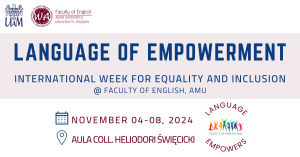The Faculty of English at Adam Mickiewicz University, Poznan, cordially invites everyone to participate in the fifth edition of the annual seminar series entitled “Language of Empowerment” as part of the International Week for Equality and Inclusion between the 4th and 8th November 2024. Through this event, they aim to raise awareness of the dangers of discrimination and contribute to the global debate on values such as acceptance and equality, following the UNESCO proclamation that:
“Tolerance is respect, acceptance and appreciation of the rich diversity of our world's cultures, our forms of expression and ways of being human. It is fostered by knowledge, openness, communication, and freedom of thought, conscience and belief. Tolerance is harmony in difference. It is not only a moral duty, it is also a political and legal requirement. Tolerance, the virtue that makes peace possible, contributes to the replacement of the culture of war by a culture of peace." (UNESCO's 1995 Declaration of Principles on Tolerance).
The “Language of Empowerment” at the Faculty of English AMU will feature a series of 45-minute lectures.
Venue: Auditory room, Collegium Heliodori Święcicki, Grunwaldzka 6, Poznań
.
MONDAY, 04/11/2024, 3:00 PM (CET)
Opening address by Prof. Joanna Pawelczyk, Dean of the Faculty of English, Adam Mickiewicz University, Poznan
Opening lecture: Katarzyna Kotula, PolishMinister for Equality
TUESDAY, 05/11/2024, 3:00 PM (CET)
Mary Ellen Curtin, American University, Washington, DC
Race, representation, and the pursuit of a meaningful vote in US politics
My talk will address the complex history of race, ethnicity, and voting rights and practices in the US since emancipation. It will highlight how voting rights activists have pushed the courts and congress to make the votes of Black Americans and other racial minorities count, and how racial disfranchisement remains a potent political weapon.
THURSDAY, 07/11/2024, 3:00 PM (CET)
Kacper Łodzikowski, Adam Mickiewicz University, Poznań
Challenges of implicit bias in AI: Towards awareness and mitigation
Artificial Intelligence (AI) has the potential to shape our lives for the better. However, it can also inherit and amplify the implicit and explicit biases of the humans who—knowingly or unknowingly—provide the data for AI training. In this lecture, we will explore how implicit bias manifests in AI systems through data, algorithms, and user interactions. We will start by examining real-world examples where AI has perpetuated discrimination in areas such as social media, healthcare, criminal justice, and employment. We will delve into the ethical implications of biased AI and its impact on society. Finally, we will discuss emerging strategies for mitigating bias, such as enhancing data diversity and raising awareness among end users. Throughout, we will pay special attention to generative AI and its role in blurring the line between human-created and machine-generated content, which raises additional questions about bias, authenticity, and trust.
FRIDAY, 08/11/2024, 3:00 PM (CET)
Iwona Mazur, Adam Mickiewicz University, Poznań
A functional approach to audio description as a means of social inclusion in a multimodal world
We live in an increasingly interconnected and multimodal world: we watch videos on YouTube, consume content on Instagram or TikTok, watch films on Netflix or Disney+. In the above media, the visual, verbal and aural channels interact to create meaning (see, e.g., Kress 2010; Kress and van Leeuwen 2001). However, not always is this meaning clear or accessible to all. For instance, the visual channel cannot be accessed by persons with sight loss. Here is where audio description (AD) – which translates the visual into the verbal – enters the picture (quite literally). However, I will argue that AD as a tool for accessibility not always equals social inclusion. In the presentation, I will talk about a functional approach to AD, and propose how the application of a number of functional parameters can ensure that the audio described version is not just accessible but also inclusive to the greatest extent possible.
